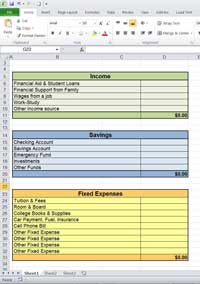Creating a budget in your first year of college is essential.
Putting a budget plan in place can significantly reduce the likelihood of owing thousands of dollars in student loans and other consumer debt by the time you graduate from college.
To get started, here are some simple tips that you can implement to create a budget and manage your finances while attending college.
1. How to make a budget for college students
Everyone will tell you to create a budget, but it’s more complex than just simply jotting down a few numbers on a sheet of paper.
Here’s how to set up a budget plan that you can actually stick to.
Step 1:
Count the money! Whether you’re working a part-time job, getting support from family, or receiving financial aid, all of these funds could be thought of as income.
As a student, you will likely have both fixed and variable expenses.
And while both categories are important to control, variable expenses are typically the easiest to try and reduce.
Here’s a simple cheat sheet that you can follow to easily organize budget items:
INCOME
• Wages from a part-time job
• Financial support from family
• Financial aid & student loans
FIXED EXPENSES
• Tuition and fees
• Room & Board
• College books and supplies
• Car payment, fuel, and insurance
• Cell Phone Bill
VARIABLE EXPENSES
• Food
• Personal Care
• Entertainment
• Health
• Travel
• Emergency Expenses
Step 2:
Make a plan! Look at the numbers, and decide how much you can spend and where you can reduce expenses.
Step 3:
Start establishing good money habits early!
Trust me, even when you make a budget, you won’t carry it around on a piece of paper or refer to it daily.
Set realistic targets that you can stick to and start making decisions accordingly.
2. Set-up an Emergency Fund
You’ll quickly realize that you can never be too prepared for unexpected emergency expenses.
When you begin college, start putting money away as soon as possible for a “rainy day” fund.
Then keep adding a little to it each month. Don’t worry if it’s just a few dollars.
You’ll be surprised at just how much those small contributions can grow your savings over time.
Having an emergency fund provides a sense of assurance.
Think twice about tapping your emergency fund to make impulse purchases.
Ask yourself if the situation requires you to use the funds or if there is another way to resolve the problem.
3. Watch out for Credit Cards
You will likely be inundated with companies trying to offer you credit cards.
Credit cards are a great convenience, but they can cause more harm than good for you as a college student.
Here are some things to consider about credit cards:
• A credit card can almost be thought of as a loan.
• If your balance is not paid in full by the following statement closing date, you will typically incur interest charges on top of your outstanding balance.
• Before you use a credit card, consider checking your budget first.
• Is the expense a part of your budget?
• Can you pay off the charge in full by the next closing date?
4. Look out for Small Expenses
Rather than buying coffee from a retail store each day, purchase a coffee maker instead.
You can also try preparing more healthier meals at home to avoid the added the added cost of purchasing food on-the-go.
5. Student Discounts
There are many sales and retail discounts specifically geared toward college students. Look for them in your local paper or online coupon site.
Consider renting out items for one-time use instead of buying them outright to save more money.
6. Earn an Income
One of the most important things you can do while attending college is to start earning an income, whether it’s a part-time job or a work-study position.
Another great way to strengthen your job prospects after college is to look for paid internship opportunities.
Internships can often provide valuable work experience and help to secure a full-time job after graduation.
The more income you can earn now while still prioritizing your studies, the better shape you’ll be in to stick to your budget.
Finally
Remember to have fun during your college years.
College is all about learning, and acquiring the skills to help you manage your money now will likely stick with you well beyond your four years of undergrad.
College life is also about creating lasting connections and enjoying many beautiful experiences.
You don’t have to overwhelm yourself with budgeting all the time.
Remember to have a plan and try to stick to it as much as possible.
Good spending habits tend to stay with you, so the sooner you start, the better.
Looking for some additional help to organize & track your monthly income & expense categories? Try our custom budget worksheet for college students. Get your copy of the 2023 version now for just $8.95.

